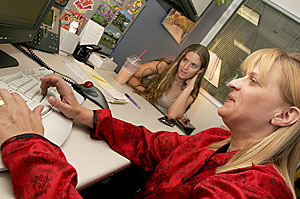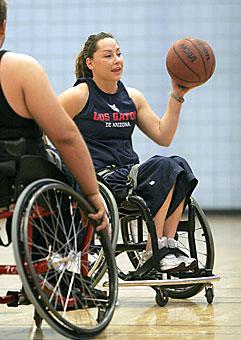 |
|
JACOB KONST/Arizona Daily Wildcat
|
Anthropology junior Nicole French speaks with Disability Specialist Phyllis Cowman yesterday at the Disability Resource Center. The DRC has been raising awareness about the disabled community this past month in their "Disability Reframed: Challenging Concepts of Normality" series.
|
|
|
By Anthony D. Ávila
Arizona Daily Wildcat
Friday, April 22, 2005
Print this
Instead of being contained to only a month of awareness, some students and specialists hope to create a disability studies department on campus to increase awareness year round.
The Disability Resource Center is promoting the "disability studies movement," said David Corsi, a DRC disability specialist for 15 years. He said there has been an increase in awareness, but there has not yet been a department dedicated to educating people about the subject.
This month, the DRC has been holding its annual Disability Reframed series to raise awareness about the disabled community.
The aim of the movement is to institute more disability studies departments in colleges across the country, which would be modeled after more familiar degree programs such as women's studies and African-American studies, Corsi said.
Corsi suggested fusing existing research and knowledge about disability into common programs, such as sociology and social sciences, to reflect a more progressive view of disability.
 |
|
JAKE LACEYArizona Daily Wildcat
|
Education junior Alana Nichols plays for the Wheelcats basketball team. Nichols transferred from the University of New Mexico because the UA Adaptive Athletics program gave her the opportunity to play sports again.
|
|
|
"There is a rich body of information and research surrounding disability already," Corsi said.
Corsi said it is also important for people to be aware of how disability is portrayed by the media, and it will take active correction and affirmation until disabled people are represented as independent, self-determined and capable contributors to society.
Gabe Nyrkkanen, a special education and rehabilitation senior, was 23 years old studying abroad in Corbaca, Mexico, when he swung from a rope into a river and landed on the back of his head, injuring his upper vertebrae.
Termed a quadriplegic, meaning four limbs were affected by a spinal cord injury, Nyrkkanen said his immobility ranges from his shoulders down.
January marked the third year of being disabled, but Nyrkkanen said he does not look at the "anniversary" as a day of sadness, but rather as a new beginning.
"It's celebrated like a birthday," Nyrkkanen said. "You're learning how to walk again, use your muscles. It's like you're a newborn."
Nyrkkanen, who is on the UA quad-rugby team, said some members of the disabled community think negatively toward icons like Jerry Lewis and Christopher Reeves because they perpetuate stereotypes of disabled people as weak and helpless.
Nyrkkanen said empowerment is a way to turn that mentality around.
"It's not about holding a telethon to buy little Timmy a wheelchair," Nyrkkanen said. "Let's take Timmy, get him some occupational training so he can get a job and buy his own wheelchair."
Alana Nichols, a special education and rehabilitation junior, said her snowboarding injury that left her a paraplegic was a "huge, traumatic, life-changing event."
Nichols said her physical recovery, however, was not as difficult as returning to her peers in high school.
"Going back to high school in a wheelchair, that was the hardest thing I've ever done," Nichols said.
Nichols said she faced friends and classmates who were superficial and consequently said "I love you" way too many times.
Although she graduated on time, she said she was not able to enjoy activities like she used to, especially sports.
Nichols said she transferred from the University of New Mexico because of the UA Adaptive Athletics program, which gave her the opportunity to be involved in sports.
"Now I can compete like I never thought I would," Nichols said.
Nichols was selected as an alternate on the U.S. wheelchair basketball team that went to the Olympic games last summer in Athens.
"I'm looking forward to Beijing in 2008," Nichols said.
Nichols also received the $1,500 Brian Corrigan Memorial Scholarship, which was presented at this year's Lame for a Game.
As disabled students try to find their place in their community, Katie Wagner, a creative writing graduate student, said they sometimes encounter reverse discrimination from those in their own disabled community.
"Sometimes I feel like I have one foot in both (the deaf and hearing) worlds," said Wagner, who was born deaf because she was three months premature.
Wagner, who speaks and reads lips, said she is trying to reach out and become more involved in the deaf community on campus, which is very different from her undergraduate experience as the only deaf student at her college.
Wagner said people in the deaf community sometimes have negative attitudes toward other deaf people who communicate by other means than sign language.
Nicole French, an anthropology junior who has Attention Deficit Disorder, said although physical disabilities are more visible than others like learning disabilities, people from both communities can relate to one another.
"We can relate to a lot of the same stuff, just not always in the same context," French said. "Instead of needing a wheelchair to help me, maybe I just need extra time on a test."
French said she uses the DRC to take tests without distractions and she also receives support and mentoring from disability specialists like Phyllis Cowman.
French also said non-disabled people should not be overly sensitive to people who are.
"Just because there should be a sensitivity doesn't mean you have to hold me to the level of a three-year-old," French said.
Corsi said able-bodied people should work at getting over their discomfort of seeing a disabled person move and function on their own.
"Just because there was a tragic event doesn't mean that person has to lead a tragic life," Corsi said. "We need to see them as disabled, but still capable of living their lives."
Nyrkkanen said living with a disability is not easy, but people should not feel sorry for him, however natural that reaction may be.
"Hey, it takes me 15 minutes to get my pants on, but that's just the way I do it," said Nyrkkanen, who owns a house and lives on his own.
Nichols said if someone wants to help a disabled person, it should be natural.
"Keep it real," Nichols said. "Don't trip all over yourself to get to the door before them and open it."
